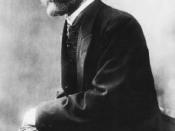SOCIAL ASPECTS OF THE CHURCH.
INTRODUCTION
A major characteristic of human society is the high degree to which almost all social situations are structured. This structuring is not always apparent. When you see a friend in the evening and ask him what he did that day, he will probably answer by listing the activities that seem to him to be the special events of the day: I got my history paper back, I received a letter from an old friend, I drove my father to the airport, I bought a new CD. He probably will not mention that he brushed his teeth, ate breakfast, and went to school that morning. Recurrent or habitual patterns of behaviour are taken so much for granted that people usually fail to notice them. They pay attention instead to the unusual, the surprising, the extraordinary.
Even though the routine and usual events of everyday life usually go unnoticed, it is precisely these activities that provide the structural basis of human societies.
From the sociological perspective, the most significant aspect of human life is the regular pattern, not the random or unique events. The sociologist's task is to study individuals and groups to discover the recurring patterns in their thought and behaviour The discipline of sociology is based on the assumption that these recurring patterns can be accurately described and predicted, and thus a clearer understanding of the human social condition may be achieved.
BACKGROUND ON RELIGION FOR SOCIOLOGICAL EXPLORATION
Religion is commonly thought to be a field of study only for the theologian and the philosopher, who try to assess the meaning and value of different beliefs. But the sociologist is also interested in religion. Rather than attempting to judge the value of religious beliefs, sociologists are interested in determining religion's role in the social...


